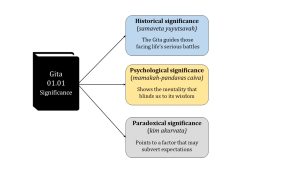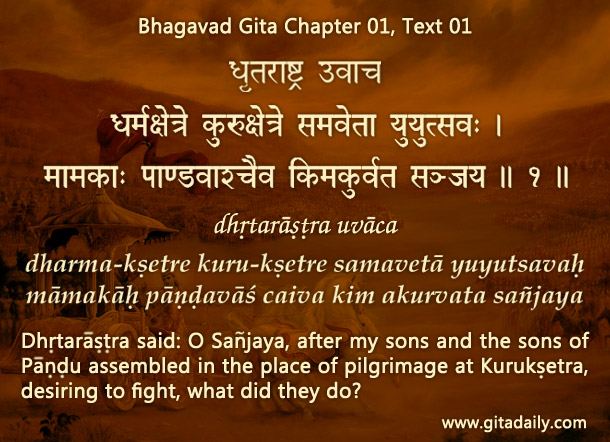 Let’s look at the significance of the last three components of the Bhagavad-gita 01.01:
Let’s look at the significance of the last three components of the Bhagavad-gita 01.01:
Historical significance (samaveta yuytsavah): Literally, this describes the juncture when the Gita is spoken — after both armies had assembled, ready to fight. Additionally, it suggests that the Gita’s wisdom is of universal relevance throughout history: it is not meant for history buffs interested in a war that happened several thousand years ago; it is meant for responsible individuals facing life’s toughest challenges like wars and seeking philosophical guidelines for judicious action.
Psychological significance (mamakah pandavas caiva): Literally, this is a straightforward enquiry about the actions of the two groups of protagonists on the battlefield — the Kauravas and the Pandavas. Additionally, this also points to the pathological psychology of the speaker, Dhritarashtra. He refers to the Kauravas as his own people, though even the Pandavas were his nephews, and he as the king was meant to treat all his citizens equally, what to speak of his nephews who had lost their father. Dhritarashtra’s word choice unwittingly discloses his partiality that contributed to, if not caused, the catastrophic fratricidal war. For those who want to avoid such blinding attachments, the Gita will offer illuminating wisdom that can inspire spiritual equality and universal solidarity.
Paradoxical significance (kim akurvata): Literally, this can be just an inquiry about events on the battlefield. But it is paradoxical because of the earlier mention of ‘assembled to fight.’ The paradox can be illustrated through a parallel: after they assembled to party, what did they do? The very question suggests an apprehension that what is expected — they partied — might not happen because of some unpredictable factor. That factor might be the vulnerability of the party venue to, say, an extreme weather event such as a rainstorm. In the Gita’s context, that wildcard is dharma-kshetra, the place is celebrated for its long history of past virtuous activities. Dhritarashtra feared that the place’s influence might affect his impious son negatively, given that Duryodhana was a recalcitrant violator of dharma. Significantly, the place did have an unexpected bearing on events — Duryodhana didn’t feel prompted to act according to dharma, but Arjuna felt driven to enquire urgently about dharma, thereby leading to the revelation of the Gita, which is a dharma-shastra (a sacred book about dharma)
To know more about this verse, please click on the image


Leave A Comment